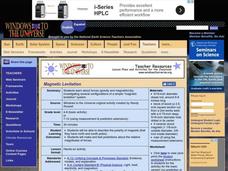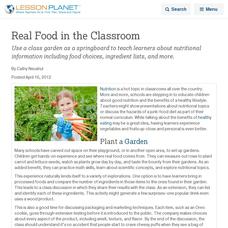Curated OER
The Study of Molecular Orientation by Linear Dimension Change of Polymeric Films
Students investigate the linear dimension change of heated plastic film and relate the results to processing and service use of the materials. They calculate percent change in dimension as related to anisotropy and molecular reorientation.
Curated OER
Condensation Polymerization
This organic chemistry lab activity is appropriate for teaching polymerization, percent yield, melting point, or the types and uses of polymer materials. Chemistry pupils imagine that they are working for a company to develop a special...
Curated OER
Elastomers: The Best Bungee Cord
Young scholars examine elastomeric polymers in a lab activity in which they design a bungee cord. Students must determine the tensile strength, percent elongation, and plot stress versus strain graphs for their experiments on rubber...
Curated OER
#21 Films, Fibers, and Solubility
Students are introduced to how the differences in solubility of materials are used in the manufacture of fibers and films. They are also introduced to the various processes used to make films and fibers. Pupils prepare fibers using wet...
Curated OER
Condensation Polymerization: Preparation of Nylon 6/6
Students participate in a lab activity in which they synthesize nylon 6/6, calculate the percent yield by mass, identify the polymer as thermoplastic or thermoset, and determine the melting point, density and end-product use of the polymer.
Curated OER
Activities for a High School Instrumentation Course
The intent of this series of activities is to introduce high schoolers to the field of chemical instrumentaiton. They perform a few basic chemistry lab techniques: pH titration, paper, gas, and liquid chromatography, ultraviolet and...
Curated OER
Intrinsic Viscosity
Students treat a high molecular weight polyvinyl alcohol polymer with potassium periodate. They measure the viscosity of polyvinyl alcohols.
Curated OER
#17 Determining the Accuracy of Selected Laboratory Glassware
Students calculate the volume of a specific mass of water placed in selected pieces of common laboratory glassware, using the density formula. They then determine the accuracy of the volumetric measurement for selected pieces of...
Curated OER
# 14 Experimenting with Copper (II) Solutions
Students determine that the relative concentration of copper ions in water can be determined by a color comparison. They make a copper (II) sulfate solution of a given concentration. Students dilute their initial solutions until their...
Curated OER
# 18 Gas Chromatography: Introduction and Application
Students are introduced to a gas chromatography using a discovery-based approach. They are presented with a scenario/industrial application where their job is to verify that the company's mouthwash contains a specific percentage of...
Curated OER
Fingerprinting Lab
Young scholars recover latent prints by iodine fuming, cyanoacrylate fuming, and dusting with powder, after a lecture/discussion on fingerprinting techniques. They each provide a fingerprint for identification by another student. A...
Curated OER
Using Plant Pigments to Link a Suspect to a Crime
Learners use chromatography to separate plant pigments collected from a fictitious crime scene and suspects. They compare the Rf values of the plant pigments to determine whether the plant pigments found on any of the suspects match the...
Curated OER
Using a Controlled Experiment to Identify Two Unknown Plasmids
Student demonstrate knowledge of recombinant DNA techniques (restriction enzyme digest, gel electrophoresis, and staining gel). They demonstrate skills needed to complete a gel electrophoresis and interpret a stained gel. Pupils solve...
Curated OER
Shot Put Arc
Middle schoolers complete Part A: Dissecting a Circle. They generate their own chords within the circle. Students measure the various parts of the arc in the shot put pit. The first two measurements, the chord and distance from the...
Curated OER
Monoprint Screams on Clay
Using a famous painting as a model, have your class create their own works of art. Learners take a look at the painting "The Scream" by Edvard Munch, discuss their thoughts on it, and use a similar process to design their own art. What a...
Arizona State University
Tricorn Triangles
Help your learners examine triangles. Pupils explore the different sizes and measurements of triangles. They discover triangles can be isosceles or scalene, and examine the attributes of triangles. Here is the website where you can...
Curated OER
Happy Mealtimes
Students read The Hungry Caterpillar to examine healthy eating habits. For this food and nutrition lesson, students role play the various responsibilities during family mealtime. They will discuss the struggles of healthy eating, and the...
Curated OER
Magnetic Levitation
A thorough investigation of magnetic levitation; this activity has four parts. First, physical scientists play with a wooden dowel and three disc magnets to review polarity and repelling action. Then they experiment with...
Curated OER
Animal Science as Agriculture
The methods by which farming and agriculture became a valid area of study and research are detailed in this PowerPoint. Also presented are the steps involved for improving productivity and efficiency. The use of scientific method...
Curated OER
Jelly Bean Math Activities
Using jelly beans as math manipulatives can be a tasty way to introduce and reinforce math concepts. Regardless of the time of year, candy can be used to excite learners and facilitate a wide variety of mathematical concepts.
Curated OER
Real Food in the Classroom
Use a class garden to teach learners about real food, nutrition, and more.
Curated OER
This Spring Turn Over a New Leaf
Spring is the time to focus on social skills and stress management.
Google
The Law of Large Numbers and Probability
Learners investigate why theoretical probability doesn't always match reality. The activity involves using Python 2.7 (or Sage) to set up a Bernoulli Trial. It also involves setting up a spreadsheet to simulate the Birthday Paradox....
Curated OER
Inferences Using Evidence
What is an inference, and how can you use textual evidence to create one? Introduce your developing readers to the world of inferencing with this presentation. Terms are defined, and several examples are shown. The class works together...

























